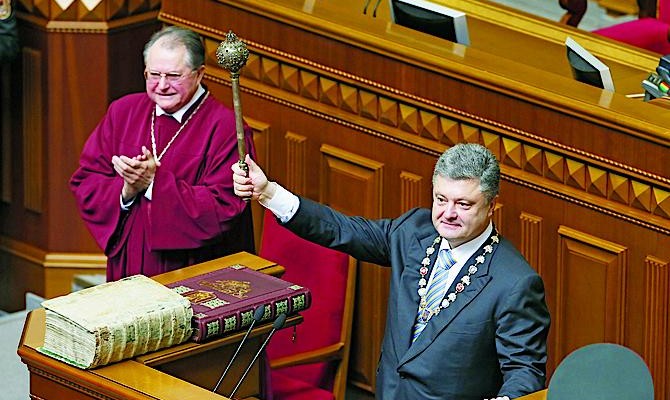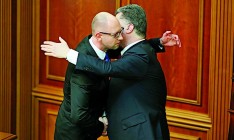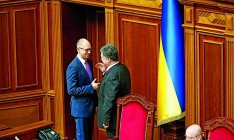Politics
maneuversThe new Constitution will resolve the language issue and will expand the powers of the president

Yesterday, President Petro Poroshenko announced that his draft law on amendments to the Constitution of Ukraine was registered in the Verkhovna Rada. At the moment the issue went to print the document was not published on the official site of the parliament, but the VR confirmed that “it will wait for the bill submitted by the president”.
Capital managed to get a copy of the draft law announced by the head of state in the Presidential Administration. The document, which proposes amendments to 19 articles of the Constitution, differs a little from the working version given out to leaders of factions. However, the main clauses remain the same as before – decentralization of power, strengthening the president’s influence on law enforcement ministries and simplification of the formation of a parliamentary coalition.
The new revision of the Constitution reduces the role of parliamentary factions and their leaders, meaning that now the coalition in the VR will be formed by the majority of the deputies. The imperative mandate is also to be modified – MPs elected by party lists need not worry about being stripped of their authority in the event of their refusal to join a faction.
MP Pavlo Rozenko (UDAR) called the proposed changes “a step towards larger democracy within the walls of the parliament”. He added that those factions that grew accustomed to unquestioned subordination of MPs to the directives of their leaders will have to change their modus operandi.
Deputy Head of the Batkivshchyna faction Dmytro Shlemko feels that the changes proposed by Poroshenko could mean the start of a transition to a first-past-the-post system of the parliamentary elections.
Language barrier
A reference to other languages, in particular Russian, has appeared in the Constitution for the first time. Local councils have been granted the right within the confines of the law to give languages special status on the territories of communities. In the opinions of parliament members, the president was forced to make this step in response to the political instability in the eastern regions of Ukraine.
MP Oleksandr Bryhinets (Batkivshchyna) noted that at this point it is unclear how the “special” status will be interpreted for languages in the regions of the country. “It is important to understand what is behind such a wording. Is this not a covert attempt to introduce a second national language?” he told Capital.
Moreover, Poroshenko assured at a meeting of representatives of local self-government bodies that Ukrainian will be the only official and constitutional language of Ukraine. Vice Speaker Ruslan Koshulynskiy confirmed that the norm regarding languages appeared in the document at the very last moment. “Every document is drafted in mad rush. Indeed, the norm regarding languages appeared this past Wednesday, he said, not ruling out that more amendments will be made to the draft law in the nearest days.
Six months for revision
Amendments to the Constitution expand the control of the president over the law enforcement bodies, meaning there will be no need to coordinate with the parliament the dismissal of heads of the State Security Service, the State Investigation Bureau and the Prosecutor General. There is also a proposal that the parliament empower the president with the right to appoint and dismiss leadership of national commissions and state regulatory bodies. In exchange, the head of state shall be obligated to coordinate with the premier the candidacies of ministers of foreign affairs and defense, which at the moment he independently submits to the VR.
The main amendments will have an impact on local self-government: while the president will lose the vertical of power, he will keep the regions under his personal control. It is proposed that oblast and regional state administrations be liquidated with their authorities handed over to executive committees of local councils. Secretaries of local councils will become the chairs of these committees. The local budgets and taxes will be under their control. In place of Oblast State Administrations the post of the presidential envoy, who will be independently appointed by the head of state, will be created. Today, the heads of OSA are appointed by the president upon nomination by the premier. Presidential envoys will have the power to block any decisions of local executive committees that contradict the law through courts.
Anatoliy Tkachuk, an advisor to the Vice Premier Volodymyr Groisman, told Capital that expert groups are already working on drafting bills that will regulate financial-economic activity in the regions in the process of decentralization of power. The laws are planned to be drafted by the end of 2014.
Koshulynskiy predicts the review of the president’s bill by the VR as early as the end of next week.








 of the agreement of syndication with Financial Times Limited are strictly prohibited. Use of materials which refers to France-Presse, Reuters, Interfax-Ukraine, Ukrainian News, UNIAN agencies is strictly prohibited. Materials marked
of the agreement of syndication with Financial Times Limited are strictly prohibited. Use of materials which refers to France-Presse, Reuters, Interfax-Ukraine, Ukrainian News, UNIAN agencies is strictly prohibited. Materials marked  are published as advertisements.
are published as advertisements.